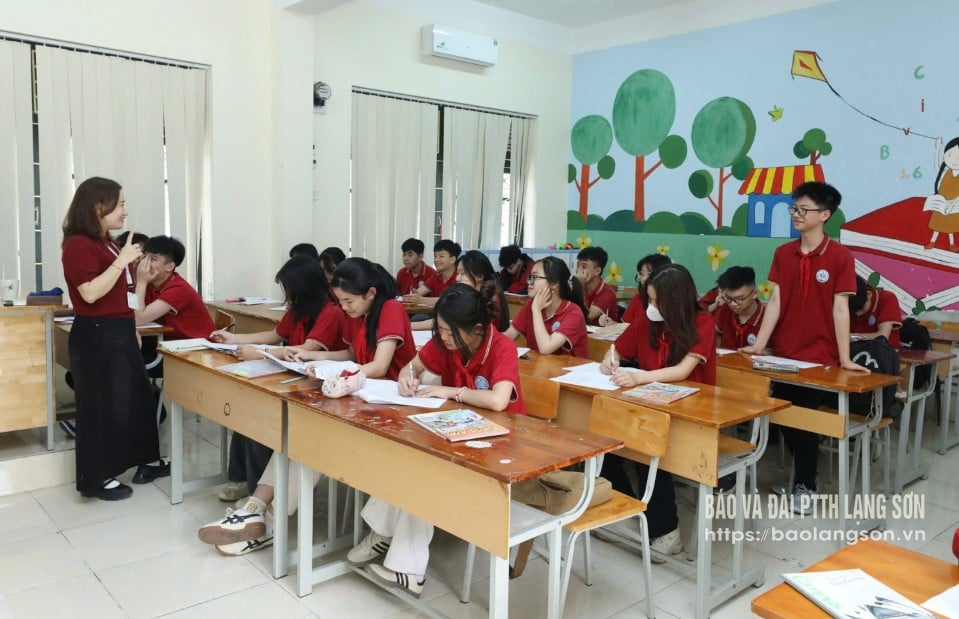
The practical implementation of the 10th grade entrance exam review in districts and cities across the province in the 2024-2025 school year has shown that the effectiveness does not come from mechanically extending the review time, but from innovation in thinking and organizing review methods scientifically , close to the learners' capacity. The shift from "reviewing a lot" to "reviewing correctly and accurately" has created positive changes, demonstrated through a clear improvement in the average score in a number of exam subjects. The whole province recorded an average score of 6.23 for Literature (an increase of 0.83 points compared to 2023), and 3.63 for English (an increase of 0.46 points). In particular, Loc Binh district is a bright spot when the rate of students admitted to grade 10 in the 2024-2025 school year reached 90.5%, an increase of 12.5% compared to the previous year. These telling numbers not only reflect the efforts of teachers and students, but also affirm the effectiveness of organizing focused, key review sessions suitable for each student group.
Based on that and the changes in the organization of final grade teaching in the 2024-2025 school year, especially after Circular 29/2024/TT-BGDDT dated December 24, 2024 of the Ministry of Education and Training "Regulations on additional teaching and learning" took effect from February 2025, requiring public schools to stop organizing two sessions/day for a fee. The Department of Education and Training has issued a directive, requiring schools to develop a review plan suitable to students' abilities, actual conditions and closely following the requirements of exam innovation. The review focus has shifted from increasing the number of periods to increasing efficiency: correct content, correct method, correct subject.
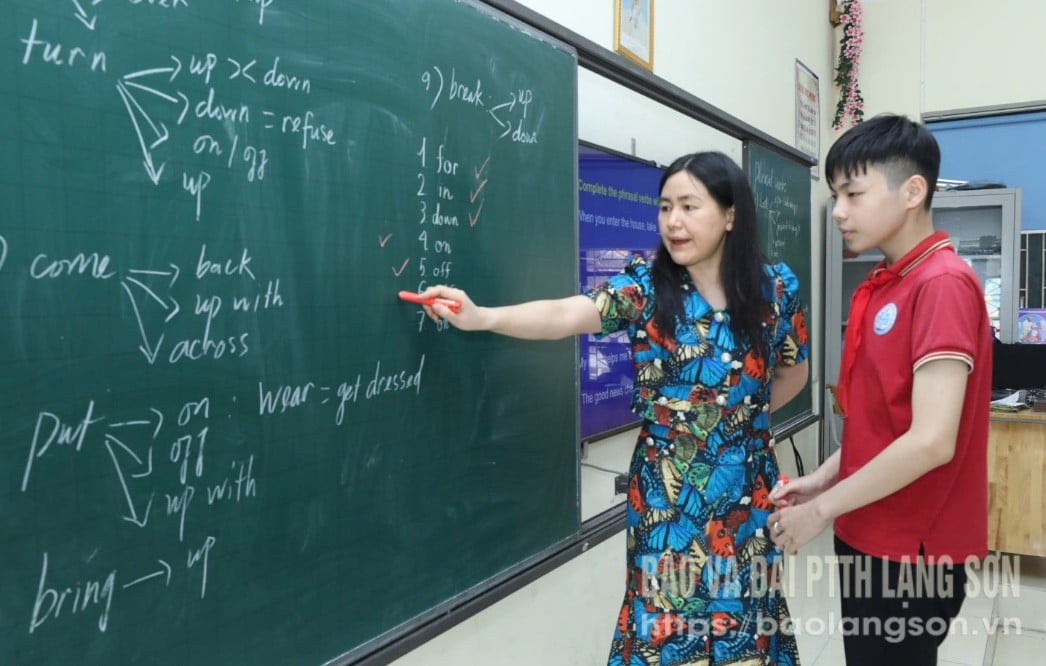
One of the notable new points is that from the 2024-2025 school year, the Department of Education and Training has compiled and published a set of review documents for grade 9 for common use throughout the province. The set of documents includes topics for each subject, a system of practice questions and exercises clearly differentiated according to cognitive levels. The documents not only support teachers in developing review content, but also help students to self-study and review effectively at home.
At the same time, schools are promoting the application of information technology, using software to support monitoring learning progress and implementing analysis of students' learning outcomes through artificial intelligence (AI) tools. Mr. Hoang Van Thao, Deputy Head of the Secondary Education Department, Department of Education and Training, said: "The Department has advised the Department's leaders to request schools to apply software to get feedback from students, monitor their review progress, and from there design a separate learning path for each student, based on analyzing their capacity and learning progress using artificial intelligence. This is a suitable direction in the current context of digital transformation, helping students receive proper support, especially those in disadvantaged areas."
In fact, many schools have proactively implemented a flexible review model, suitable for the characteristics of students and available resources. At Mai Pha Secondary School (Lang Son City), the school organizes three review sessions per week in the afternoon, and divides 9th grade students into two groups according to their academic ability. Ms. Pham Thu Ha, a math teacher, said: “We focus on reviewing basic test-taking skills and selecting key content. For good and excellent students, teachers give additional advanced lessons, and for average and weak students, we support them in the direction of tutoring and consolidating basic knowledge so that they are not left behind.” Thanks to that, the review does not cause pressure but helps students approach knowledge more proactively and effectively.
According to research at schools, in the current final stage, the review atmosphere at secondary schools is taking place more urgently and fiercely than ever. At Cao Loc town secondary school, Ms. Nguyen Thi Kim Oanh, a literature teacher, said: “At this time, we focus on consolidating key topics, assigning clear learning tasks so that students can study and practice on their own. Each review period is carefully designed, combining in-class and homework exercises so that students can practice their test-taking skills more deeply and firmly.” Similarly, at Dong Mo town secondary school, the school has implemented review in stages with increasing intensity, in which the current stage is doing comprehensive tests close to the official exam structure. Hoang Huu Trong, a 9C student, shared: “The exam is near, so I have increased the time for self-study at home, practicing more tests after hours according to the province's general review materials. Teachers correct the tests very carefully, and we also have to try twice as hard to not miss any knowledge.” These efforts are contributing to creating a serious and synchronized review atmosphere between teachers and students, with the common goal of conquering the upcoming 10th grade entrance exam confidently and effectively.
Notably, the mock exam organized by the Department of Education and Training on May 8 and 9 with three subjects: Literature, Math and English has become an important preparation step for the official exam. This is an opportunity for students to get acquainted with the new exam structure according to the differentiation matrix, and at the same time helps schools review and evaluate students' abilities on a large scale.
Immediately after the exam ended, units quickly analyzed the results according to each type of test and each question to adjust the review content appropriately for the final stage. Many schools have also taken advantage of AI technology to analyze the test and design a personalized review roadmap for each student, especially those with weak skills or subjects. This approach is not only effective in a short time but also saves time and effort for both teachers and students.
The final stage is placing higher demands on the organization, management and effectiveness of each review hour. However, with the initiative of the industry, the sense of responsibility of teachers, and especially the increasingly good learning awareness of students, we can believe in a successful exam season. The review atmosphere is becoming more and more exciting, each exercise, each review hour is an important stepping stone for 9th graders to confidently enter the exam, not only with knowledge, but also with a more solid mindset for the learning journey ahead.
Source: https://baolangson.vn/lop-9-nuoc-rut-on-thi-vao-10-5046453.html





![[Photo] Nearly 3,000 students moved by stories about soldiers](https://vphoto.vietnam.vn/thumb/1200x675/vietnam/resource/IMAGE/2025/5/17/21da57c8241e42438b423eaa37215e0e)

![[Photo] Readers line up to visit the photo exhibition and receive a special publication commemorating the 135th birthday of President Ho Chi Minh at Nhan Dan Newspaper](https://vphoto.vietnam.vn/thumb/1200x675/vietnam/resource/IMAGE/2025/5/17/85b3197fc6bd43e6a9ee4db15101005b)








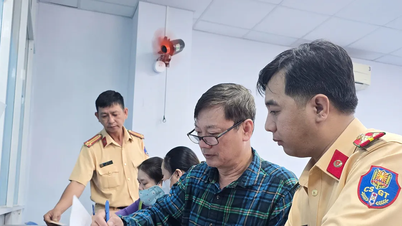

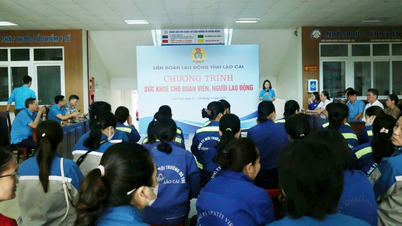































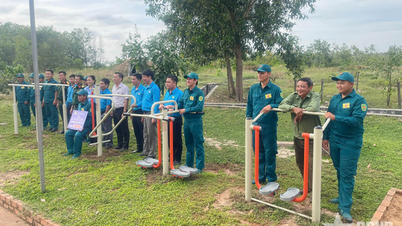
















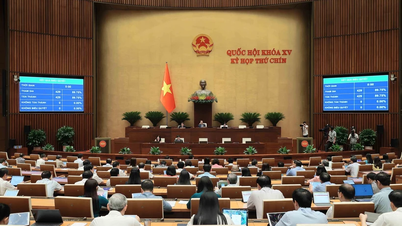




























Comment (0)